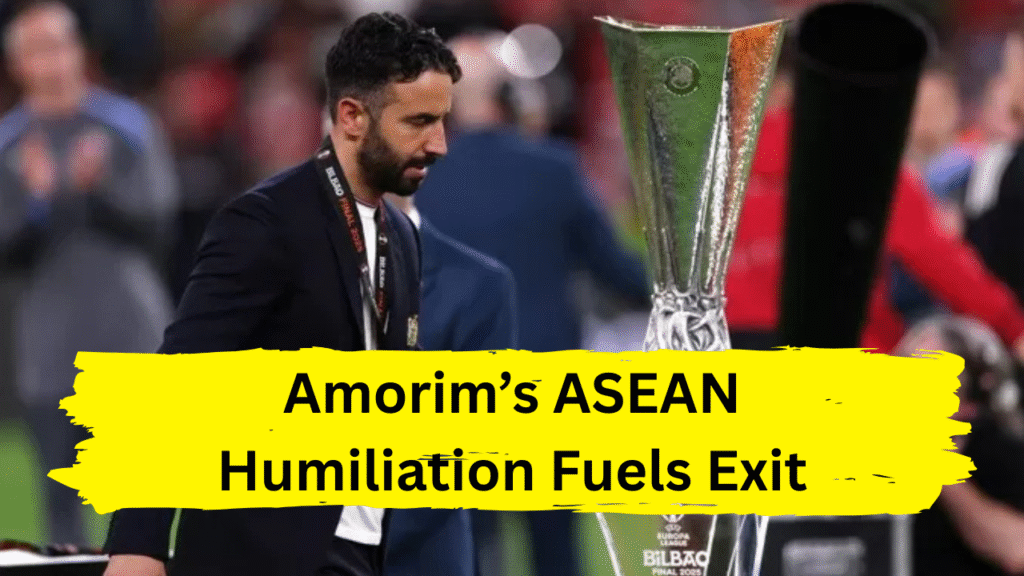The monsoon rains lashing Kuala Lumpur felt like nature’s cruel metaphor for the deluge engulfing Ruben Amorim. Just hours before, the Portuguese manager had sat in the Bukit Jalil stands, a reluctant spectator to a sporting catastrophe that may well have sealed his fate. Manchester United’s 1-0 defeat to the ASEAN All-Stars wasn’t just a shocking result; it was the grotesque, glaring exclamation point on a season of unmitigated disaster under his command. For Amorim, hailed as the visionary savior less than a year ago, the humid Malaysian night descended into a chilling preview of the reception awaiting him back in Manchester. The question is no longer if the axe falls, but when.
From Sporting Saviour to Theatre of Nightmares: A Year Unraveled
Amorim’s arrival at Old Trafford in the summer of 2024 was draped in optimism. Fresh from breaking Benfica and Sporting Lisbon’s dominance in Portugal, his intense, tactically flexible brand of football promised a revolution. He spoke of restoring United’s identity, of high pressing, verticality, and harnessing the power of youth. Fast forward to May 2025, and the revolution lies in tatters. The season reads like a chronicle of failure:
- Premier League Plunge: A dismal league campaign saw United stagger to their lowest finish in decades, miles adrift of the Champions League places, often outplayed by mid-table sides. The promised attacking verve dissolved into predictable, labored possession devoid of incision.
- Cup Calamities: Early exits in both domestic cups, including humbling defeats to lower-league opposition, stripped away any veneer of progress. The lack of fight in these games became a damning indictment.
- Tactical Turmoil: Amorim’s much-vaunted system never truly took root. Constant tinkering with formations and personnel bred confusion. Players looked lost, devoid of understanding or belief in the plan. The high press was easily bypassed, the attacking patterns sterile.
- Player Disconnect: Whispers of player unrest grew into audible rumbles. Key figures, including established stars and promising youngsters like Alejandro Garnacho (whose baffling benching in Kuala Lumpur became a lightning rod), seemed disconnected from the manager’s methods. The dressing room, a fragile ecosystem at the best of times, fractured.
The ASEAN defeat was not an isolated incident. It was the inevitable, grotesque culmination of this systemic rot. Losing to a team assembled weeks prior, featuring players from leagues orders of magnitude below the Premier League, wasn’t just embarrassing; it was existential. It screamed that United, under Amorim, had sunk below a level previously thought unimaginable. The “woeful form” noted by the Telegraph after the Villa win wasn’t ended; it was perfected in the most humiliating way possible.
Kuala Lumpur: The Boos, The Bench, and The Breaking Point
The Malaysia trip was meant to be a lucrative, low-pressure tour. Instead, it became Amorim’s public crucifixion. His presence in the stands, intended perhaps as observation or a show of support, backfired spectacularly. The travelling United support, a microcosm of the global fanbase’s fury, greeted him with a wave of visceral boos. This wasn’t just frustration; it was raw, unadulterated rejection. The cameras captured Amorim’s stony-faced reaction, but the message was seared into the global consciousness: the manager had lost the fans, utterly and completely.
Simultaneously, on the pitch, Erik ten Hag’s interim management (or lack thereof) offered a horrifying glimpse of life under Amorim’s continued reign. The baffling decision to leave Garnacho – arguably United’s most potent attacking threat this season – unused on the bench while chasing a game against part-time opponents perfectly symbolized the tactical incoherence and misjudgment plaguing the club. It felt like an extension of Amorim’s own struggles to inspire or utilize his talent effectively. The sight of United’s multi-million-pound stars being out-thought and out-fought by the ASEAN All-Stars’ organization and hunger was the ultimate visual metaphor for Amorim’s failed project.
The Weight of History and the Glazers’ Dilemma
The ASEAN humiliation lands with a sickening thud on the doorstep of the Glazer ownership and Football Director John Murtough. They gambled on Amorim, passing over other candidates, believing his potential outweighed his lack of Premier League experience. That gamble has spectacularly failed. The tour itself, cynically designed to extract £8 million from Asian markets, has instead extracted the last vestiges of the club’s global sporting credibility.
The pressure to act is now seismic. Keeping Amorim beyond this tour seems politically impossible. The fan backlash, amplified a million-fold on social media after the ASEAN defeat and the Amorim booing, is at fever pitch. Protests against the Glazers, simmering for years, will reach new intensity if Amorim remains. Sponsors, already uneasy, will recoil further. The club risks descending into complete, unmanageable chaos.
Yet, sacking Amorim presents its own minefield. The financial cost of another managerial payout is significant. More importantly, who replaces him? The pool of elite managers willing to step into this vortex of dysfunction shrinks by the day. The booing of Amorim, a manager not even officially in charge for that match, also poisoned the well for potential successors linked before the game. The club’s leadership appears paralyzed, trapped between an untenable present and a terrifyingly uncertain future.
The Final Whistle on the Amorim Experiment?
Ruben Amorim arrived at Manchester United carrying the hopes of a disillusioned giant. He leaves, in spirit if not yet officially, carrying the burden of its most humiliating modern defeat and the wreckage of a season that defies hyperbole. The loss to the ASEAN All-Stars wasn’t just a bad result; it was the final, undeniable proof that his vision has not translated, his authority has evaporated, and his project is irreparably broken.
The monsoon rains in Kuala Lumpur may wash away the physical traces of the match, but they cannot cleanse the stain on Amorim’s tenure or United’s reputation. For the Glazers and Murtough, the decision feels inevitable. Allowing Amorim to lead the team out for their next tour fixture in Hong Kong would be an act of managerial cruelty and corporate suicide. The nightmare of his first season demands an ending. The ASEAN All-Stars didn’t just beat Manchester United; they likely delivered the final, brutal blow to a manager whose dream job turned into a waking horror show. The only question left is how quickly the executioner’s call comes from Manchester.


